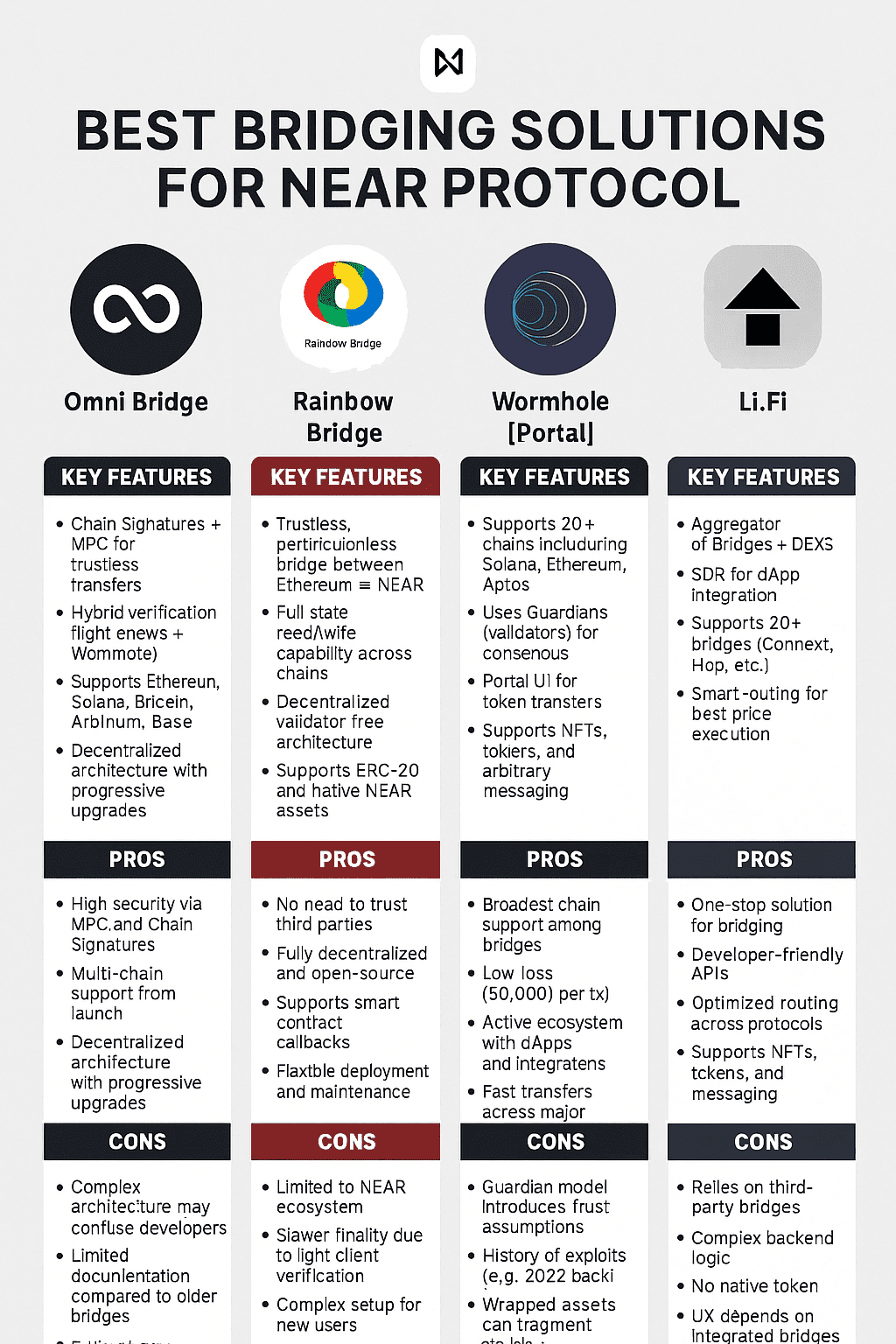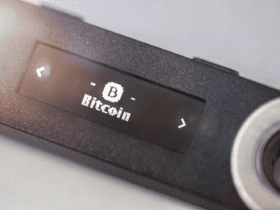It all starts with selecting the best crypto wallets for Android to ensure effective and safe crypto management. The best Android wallets prioritize user convenience, high security, and multiple asset support, for easy storage, transfer, and trading of digital currencies.
Android wallets offer varying interfaces for novice users and advanced traders dedicated to Bitcoin and Ethereum or DeFi. Regardless of the Android wallet, crypto assets are safe, available, and completely under the user’s control.
What Is a Crypto Wallet?
A crypto wallet is the most fundamental requirement of crypto. They are a starting point for a user to send, receive, and store their coins and tokens. Every Bitcoin wallet comes with private keys.
These are the wallets which are able to store your digital money. Regardless of whether you are holding Bitcoin or a hundred altcoins, you will need a crypto wallet to access the coins and tokens.
You can choose to use a wallet app on your mobile phone, a desktop app on your laptop, or a browser extension. Some wallets can be open source which means the code of the wallet is public and can be trusted more. A good wallet should be secure, user-friendly, and able to support multiple blockchains.
How to Choose the Right Crypto Wallet?
Think About How Often You Trade
Your trading habits will determine the best wallet for your needs. If you trade every day or make rapid trades, you will need a hot wallet. As it connects to the internet and offers mobile app access, it is tailored for active users.
If you plan on long-term holding or storing a large amount, a hardware wallet would add stronger offline security. For most, a combination of both offers the best protection and speed.
The Wallet and your Crypto Assets
Not every wallet will accommodate all your cryptocurrencies. Some wallets are focused as Bitcoin wallets and others will be multi-chain wallets that offer a great variety of tokens and blockchains.
If you want to access altcoins, stablecoins, or new, trendy cryptos, pick a wallet that will allow you to hold multiple assets with easy access instead of constant switching.
Understand the Costs
Most mobile hot wallets won’t charge you anything but the hardware wallets do have a one-time purchase fee. While this may sound a bit expensive, remember that it is more worthwhile when protecting larger holdings.
Also remember that some exchange-linked wallets or apps charge transaction or swap fees. They may even charge for certain features. Always check to see if there are fees you may be charged for features that you won’t even use.
Look for Essential Features
Every crypto wallet should be easy to use. Features like seed phrase backup, private key control, and responsiveness to customer requests are fundamental.
Some wallets, like mobile and desktop software or a web browser add-ons, as well as open source systems, provide more versatile options.
If you select a custodial wallet, remember to examine the security and privacy terms that the provider has put in place to protect your money.
Key Point
| Wallet | Key Features | Best For |
|---|---|---|
| Electrum | Fast, lightweight, advanced security | Experienced Bitcoin users |
| Zengo | Keyless wallet, biometric login, 24/7 support | Beginners seeking simple access |
| Coinomi | Multi-asset support, built-in exchange | Multi-crypto portfolio holders |
| Edge | Private, no KYC, password recovery | Privacy-focused mobile users |
| Best Wallet | Easy UI, secure backups, supports major coins | Everyday traders and investors |
| NOWWallet | Swap & buy crypto instantly, non-custodial | Quick exchanges without KYC |
| TrustWallet | Official Binance wallet, supports DApps | DeFi and Binance ecosystem users |
| MetaMask | Web3 support, NFT & DApp integration | Ethereum & DeFi enthusiasts |
| Coinbase Wallet | Strong security, NFT storage, Coinbase integration | Beginners linked to Coinbase exchange |
| Atomic Wallet | Staking, atomic swaps, over 500 assets | Long-term holders & stakers |
1. Electrum
Founded in 2011, Electrum is one of the oldest and most reliable Bitcoin wallets, built with a focus on speed and lightweight performance. It supports only Bitcoin, making it perfect for users who prioritize Bitcoin storage without distractions.

Available on both Android and desktop, it requires no KYC, giving users full control over their funds. Electrum uses strong security features such as seed phrases, encryption, and hardware wallet integration.
Considered among the Best Crypto Wallets for Android, it is ideal for advanced users who want a straightforward Bitcoin wallet with high-level security.
Electrum Key Features
- 2011-founded Bitcoin-only wallet
- Integrates with hardware wallets
- Lightweight, fast, and has a seed phrase backup
| Pros | Cons |
|---|---|
| Lightweight and very fast | Supports only Bitcoin |
| Strong security with seed phrases | Not beginner-friendly |
| Hardware wallet integration | Limited features compared to multi-asset wallets |
2. Zengo
Zengo, founded in 2018, is a mobile crypto wallet with a keyless security system, which means you don’t have to manage your private keys at all, manually or otherwise. It allows you to hold and transact with dozens of major cryptocurrencies, including Bitcoin, Ethereum, and stablecoins.
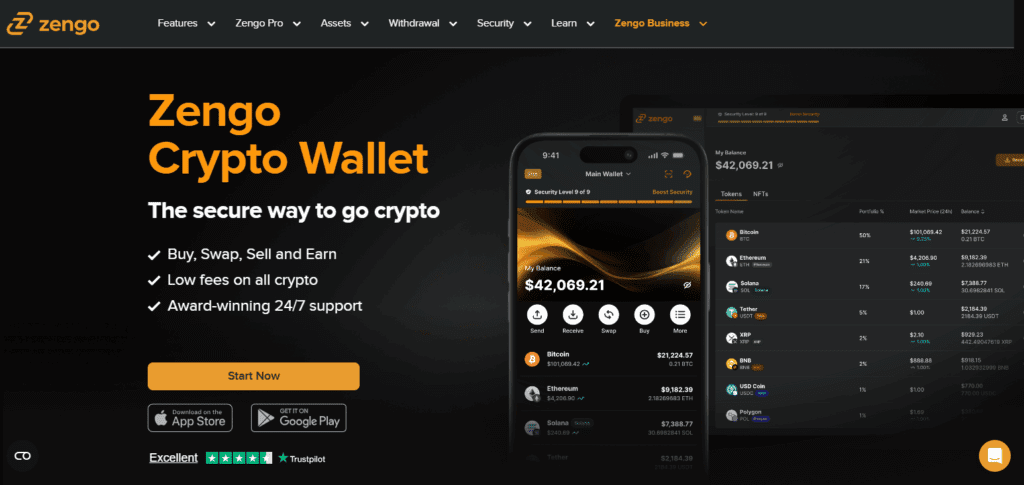
You can download the app on your Android or iOS device. Zengo is designed to be intuitive and simple to use, with all security measures implemented on the app, including biometric authentication and multiparty computation (MPC).
Zengo is designed to be intuitive and simple to use, with all security measures implemented on the app, including biometric authentication and multiparty computation (MPC). With its user-friendly design and 24/7 support, Zengo stands out as one of the Best Crypto Wallets for Android, especially for beginners who want both convenience and safety.
Zengo Key Features
- 2018-founded keyless crypto wallet
- Uses biometrics for login and MPC
- Supports Bitcoin, Ethereum, and four notable stable coins
| Pros | Cons |
|---|---|
| Keyless wallet using MPC security | Relies on cloud services |
| Biometric login, very beginner-friendly | Limited advanced controls |
| Supports Bitcoin, Ethereum, and stablecoins | Smaller asset coverage than multi-chain wallets |
3. Coinomi
Coinomi is a multi-currency wallet that was founded in 2014. It is one of the most versatile options out there, as it supports more than 1,770 cryptocurrencies and tokens. You can access it on Android, iOS, or a desktop, which is handy for cross-platform use.
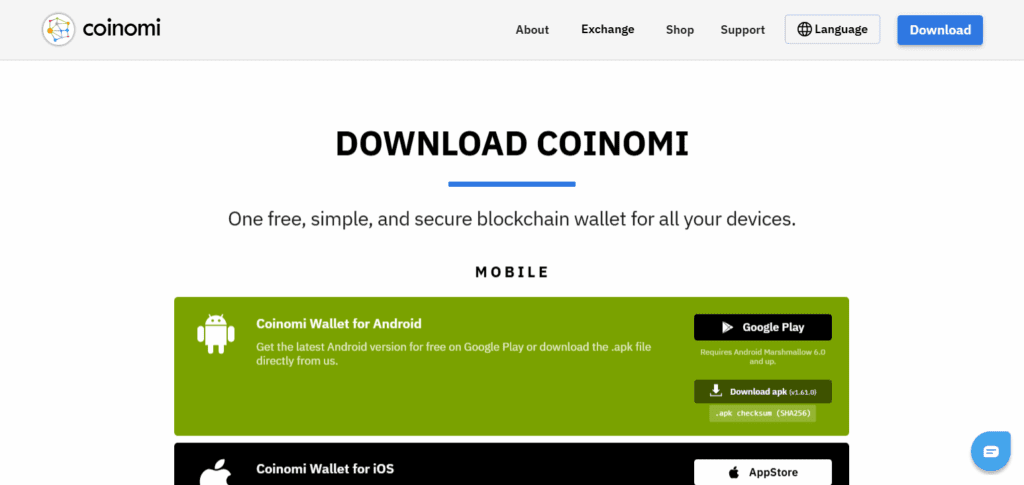
Coinomi has No KYC which makes it a true non-custododial option for users. It has a variety of built-in advanced features like seed phrase backups, wallet encryption, and built-in exchange integrations.
Coinomi is one of the Best Crypto Wallets for Android and is a good fit for traders looking to secure their funds in a reputable wallet with extensive asset support.
Coinomi Key Features
- 2014-founded, and supports over 1,700 cryptocurrencies
- Cross-platform built-in exchange and access
- No KYC, strong privacy, and seed phrase recovery
| Pros | Cons |
|---|---|
| Supports 1,700+ cryptocurrencies | Closed-source (not fully transparent) |
| Cross-platform: Android, iOS, desktop | UI feels outdated for some users |
| Built-in exchange, no KYC required | Some tokens not regularly updated |
4. Edge
2014 saw the introduction of Edge, an open-source mobile wallet accepting Bitcoin, Ethereum, Litecoin, and many altcoins. Edge is available on Android and iOS. It has non-custodial storage with no required KYC.
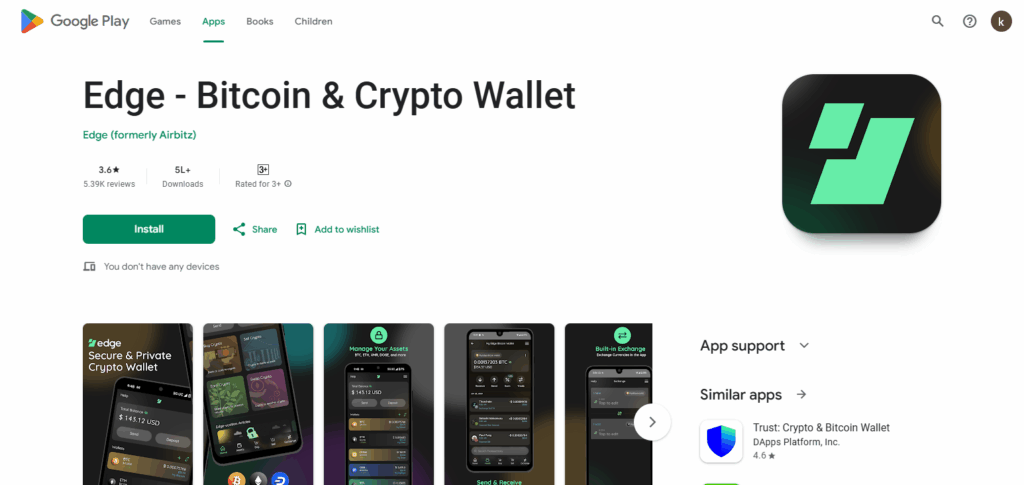
Edge enhances security with client-side encryption, two-factor authentication, and password recovery. Edge is practical for daily use because its user interface was built for beginners and advanced users.
Edge is listed among the Best Crypto Wallets for Android because of its privacy, usability, and control over the user’s private keys.
Edge Key Features
- 2014-founded, open-source non-custodial wallet
- Supports multiple cryptos with integrated exchange
- Client-side encryption and password recovery
| Pros | Cons |
|---|---|
| Open-source and privacy-focused | Interface may feel complex to beginners |
| Multi-asset support with in-app swaps | Fewer supported coins vs. competitors |
| Client-side encryption & password recovery | Less marketing/community awareness |
5. Best Wallet
Best Wallet, which began operations in 2022, aims to fulfill the need for a modern multi-chain wallet with support for primary assets, including Bitcoin, Ethereum, and stablecoins.
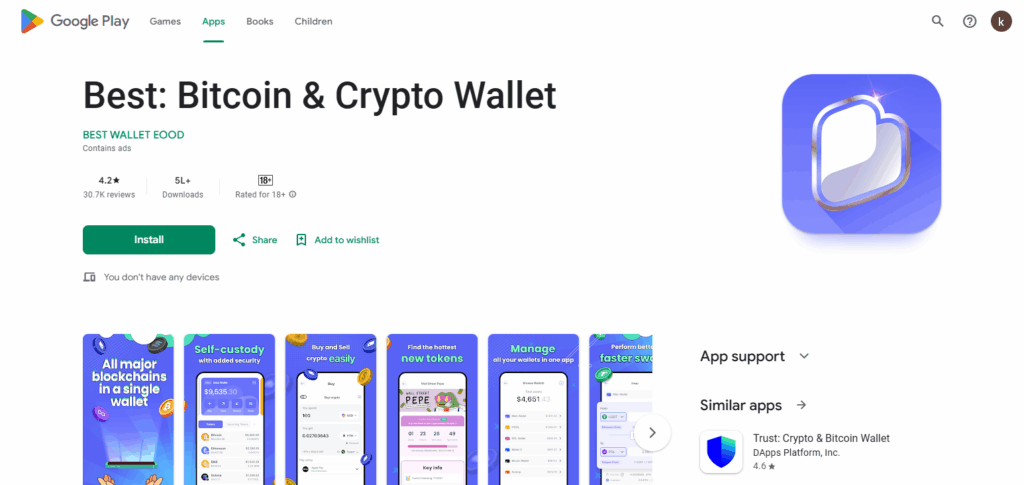
The wallet is complete on Android and iOS and has no required KYC making the wallet truly non-custodial. Security includes PIN protection, seed phrase recovery, and encrypted backups.
Best Wallet is ranked among the Best Crypto Wallets for Android because it allows everyday users to easily access secure mobile trading.
Best Wallet Key Features
- 2022-founded multi-chain wallet
- Supports Bitcoin, Ethereum, and stable coins
- Backups with PIN and seed phrase recovery
| Pros | Cons |
|---|---|
| Multi-chain support for major assets | Newer wallet, less proven track record |
| Secure backups, PIN & seed phrase recovery | Smaller user base |
| User-friendly modern interface | Limited third-party integrations |
6. NOWWallet
NOWWallet was first introduced in 2021. As a non-custodial mobile wallet, it came along with the ChangeNOW exchange and attains instant swap access without prior registration. It hosts over 500 cryptocurrencies.
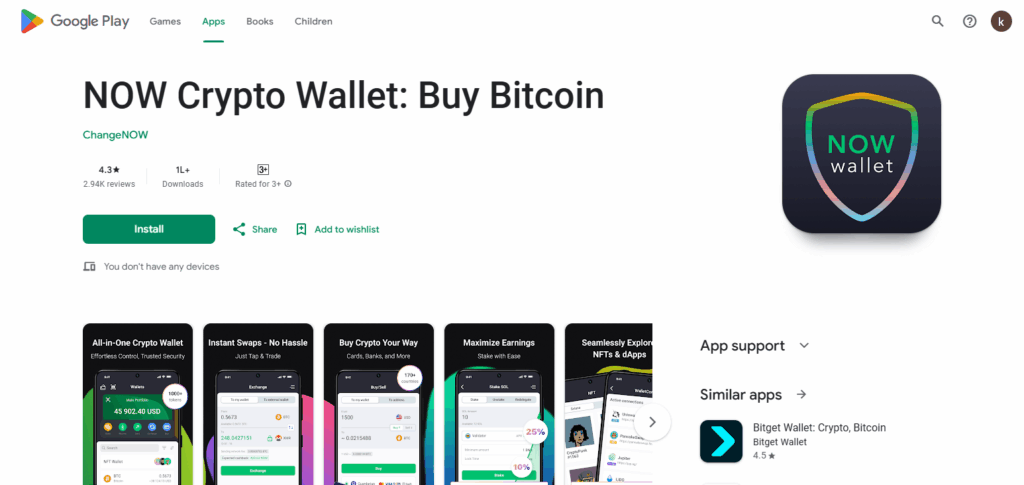
Consequently, it remains one of the most versatile wallets. NOWWallet can be downloaded in both Android and iOS versions and does not require KYC… until one decides to use a fiat exit or entrance.
For the security of the wallet, a customized piece of security is offered to the users in terms of seed phrases and private key storage, thus giving users full control. For mid-level crypto storage, overall convenience and speed makes it one of the Best Crypto Wallets for Android.
NOWWallet Key Features
- 2021-founded and supports over 500 assets
- Instant swaps with ChangeNOW exchange
- Non-custodial with no KYC, and protected seed phrase
| Pros | Cons |
|---|---|
| Supports 500+ assets | Newer wallet with less history |
| Integrated with ChangeNOW for instant swaps | Depends on third-party exchange |
| No KYC, non-custodial wallet | Limited advanced wallet features |
7. Trust Wallet
In 2018 it was acquired by Binance, which has made Trust Wallet one of the most popular wallets in the crypto market. It is one of the top crypto wallets as it is mobile and universally used as it supports over 4.5M different cryptocurrencies and tokens and over 70 different blockchains.

Available on Android and iOS, it completely non-custodial and requires no KYC. Security features include private key control, seed phrases, and biometric locks.
It also supports DeFi, NFTs, and DApps within the app. It is also, as expected, one of the Best Crypto Wallets for Android and most beneficial wallets for users within the Binance ecosystem and DeFi projects as it is very deeply integrated.
Trust Wallet Key Features
- Acquired by Binance in 2018, supports 4.5M+
- 70+ blockchains, DApps, and NFTs
- Non-custodial with biometric and seed phrase protection
| Pros | Cons |
|---|---|
| Supports 4.5M+ assets across 70+ blockchains | Owned by Binance (centralized influence) |
| DApp browser, NFTs, staking support | Can be resource-heavy on devices |
| No KYC, strong non-custodial security | Sometimes overwhelming for beginners |
8. MetaMask
Founded in 2016, MetaMask is widely known as the leading Ethereum and Web3 wallet, supporting ETH, ERC-20 tokens, and NFTs. MetaMask is a browser extension and a mobile app on Android/iOS. MetaMask has no KYC, and users have full *control.

Security is managed through encrypted key storage and seed phrase backup. As the MetMask is integrated into DeFi apps, Web3, and NFTs, it is still regarded as one of the Best Crypto Wallets for Android.
Most users, especially Ethereum enthusiasts and NFT collectors, would keep the MetMask wallet on their Android as it is one of the Best Crypto Wallets for Android.
MetaMask Key Features
- 2016 founded Ethereum & Web3 wallet
- Supports ETH, ERC-20 tokens, and NFTs.
- Works as mobile app + browser extension with DeFi integration.
| Pros | Cons |
|---|---|
| Leading Ethereum & Web3 wallet | Focused on ETH/ERC-20, limited non-EVM support |
| Supports NFTs, DApps, and DeFi apps | Gas fees can be high on Ethereum |
| Available on Android, iOS & browsers | Requires technical knowledge for full use |
9. Coinbase Wallet
This standalone wallet has been supporting thousands of cryptocurrencies including NFTs. As a 2017 product of Coinbase, the Coinbase Wallet is non-custodial unlike the main Coinbase exchange.
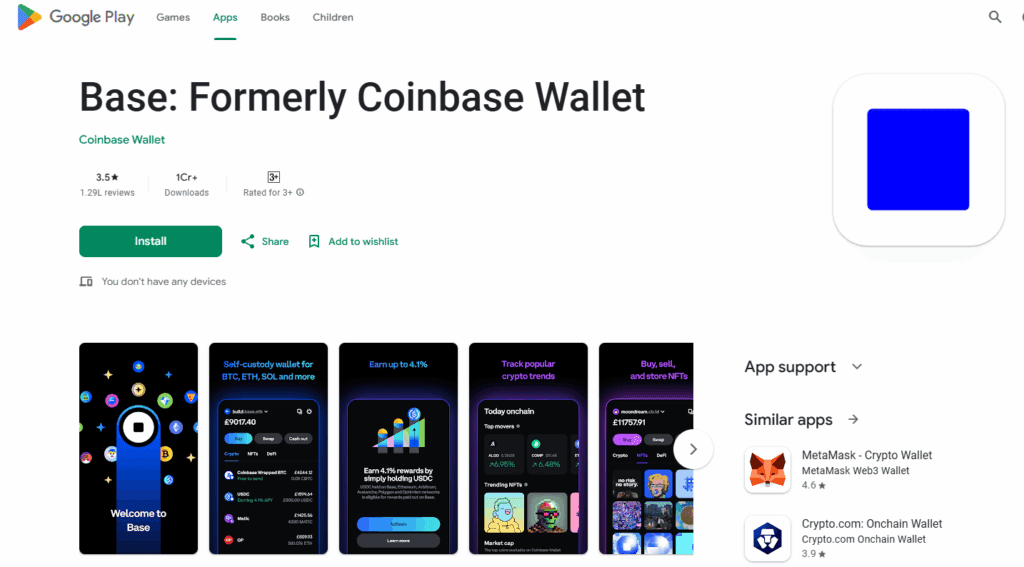
The Wester Coinbase Wallet is also spend limited as it does not KYC for use, though exchange links would enforce KYC. As for storage and wallet creation security, the Coinbase Wallet implements encrypted cloud storage, biometric device usage, and seed phrase recovery.
For those who trust Coinbase and its features, wallet and exchange working are considered the Best Crypto Wallets for Android.
Coinbase Wallet Key Features
- Started in 2017, non-custodial wallet by Coinbase.
- Supports thousands of tokens and NFTs.
- Offers cloud backup, biometric login, and easy exchange integration.
| Pros | Cons |
|---|---|
| Supports thousands of tokens & NFTs | Linking to Coinbase exchange requires KYC |
| Non-custodial with seed phrase control | Cloud backup raises privacy concerns |
| Easy integration with Coinbase ecosystem | Fees may be higher on some swaps |
10. Atomic Wallet
Founded in 2017, Atomic Wallet is a non-custodial wallet that supports over 500 cryptocurrencies, with staking and in-app purchases. Available on Android, iOS, and desktop, it allows you to gain fully in control of the wallet, with no KYC required.
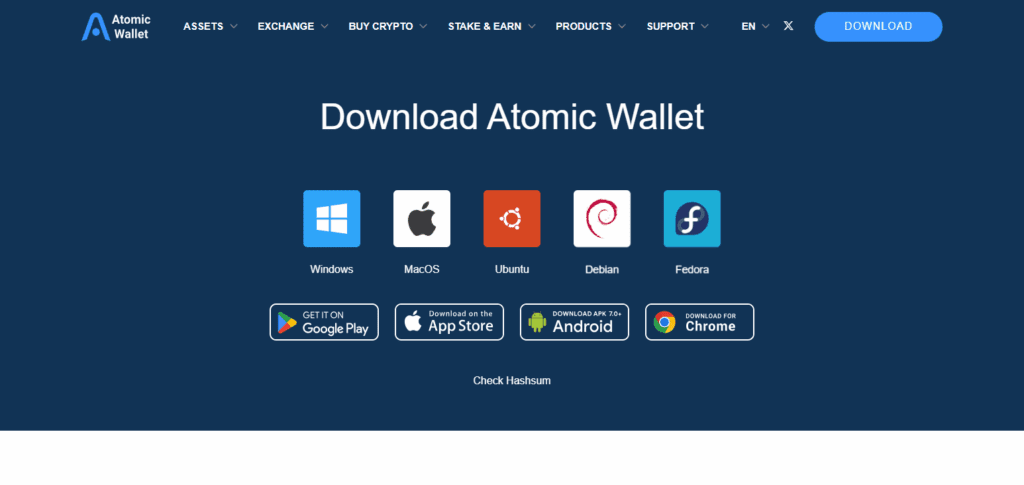
Encrypted private keys, seed phrase backups, and decentralized management are some of the wallet’s security features.
Having one of the Best Crypto Wallets for Android, Atomic Wallet is best for long term holders and stakers, as it allows you to passive earn directly from your wallet.
Atomic Wallet Key Features
- Established in 2017, supports 500+ cryptocurrencies.
- Features staking and atomic swaps inside the app.
- Non-custodial with encrypted private key storage.
| Pros | Cons |
|---|---|
| Supports 500+ cryptocurrencies | Not fully open-source |
| Built-in staking & atomic swaps | Swap fees can be high |
| Non-custodial, encrypted key storage | Customer support is sometimes slow |
How Crypto Wallets Work?
The Role of Keys
A crypto wallet does not hold your digital coins or tokens. Rather, it safeguards your public key and private key. Your public key acts as an address that people can use to send you coins. A private key acts as a password to your crypto, and as such, it gives you access to your coins.
A crypto wallet can hold as many private and public key pairs as the user wishes. Private keys are to be kept safe, as the access and control to the coins themselves are directly regulated by the keys.
Sending and Receiving Transactions
When someone sends you crypto, nothing physical is being passed. What happens is an update to the blockchain. The ownership of the crypto is transferred from the sender’s address to yours, and once the transfer is validated by the network, the new balance appears in your wallet. To send crypto, your private key is used to sign the transaction, and the blockchain then verifies and confirms the transaction.
Security and Wallet Options
Depending on your needs, there are different types of wallets. For quick and easy access, there are hot wallets on mobile apps, and for increased security, there are hardware wallets that can be kept offline for larger holdings. Regardless of your choice, always back up your wallet with a seed phrase. This ensures you can recover your funds even if your device is lost or damaged.
Choosing the Right Wallet
The different crypto wallets available have varying features. Some allow integration with multiple blockchains, deal with exchange integrations, and many offer a choice of desktop, mobile, or browser access.
You can choose between custodial wallets (managed by providers) or non-custodial wallets (purchasers have total control over the keys). Your choice should best suit your needs, but you must always keep your seed phrase safe.
Conclusion
Deciding on the best crypto wallet for Android depends on trading habits, security, and the type of cryptocurrencies each person holds. Hot wallets, for example Trust Wallet and MetaMask, are best for active traders and DeFi users whereas security is best for long-term holders with options like Electrum, which is hardware-integrated.
Coinomi, Atomic Wallet, and NOWWallet are multi-chain wallets, which are flexible for diversifying asset management. Ultimately, the balance of best security, high usability, and asset support, help keep crypto safe, accessible, and manageable on Android.
FAQ
The best crypto wallet for Android depends on your needs. For beginners, wallets like Trust Wallet or Zengo are user-friendly. Advanced users may prefer Electrum for Bitcoin security or MetaMask for Ethereum and DeFi activities.
Yes, most Android crypto wallets are secure if you choose reputable wallets, enable biometric authentication, and safely store your seed phrase/private keys. Hardware wallet integration further improves security.
Not all wallets require KYC. Non-custodial wallets like Coinomi, Atomic Wallet, and NOWWallet usually do not require verification, while wallets linked to exchanges like Coinbase Wallet may need KYC for fiat services.
Yes. Multi-chain wallets like Coinomi, Atomic Wallet, and NOWWallet support hundreds of cryptocurrencies, while wallets like Electrum are specialized for Bitcoin only.
Most wallets use a seed phrase (recovery phrase). Keep it safe offline, and you can restore your wallet on a new device if your Android phone is lost or damaged.






